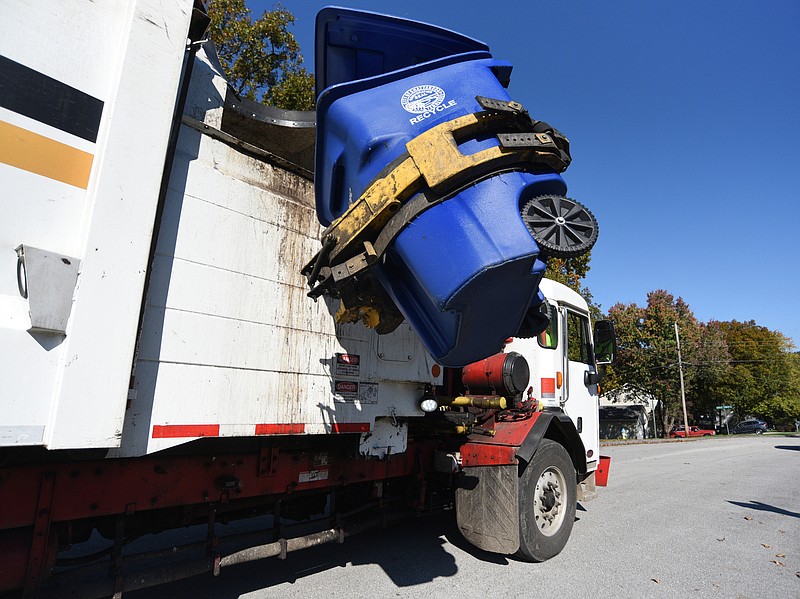The annual cost of operating the city of Chattanooga's recycling program - the operation of its curbside pickup service and its collection centers - is roughly $1.782 million.
But much of that recycling is going to the landfill, which is the place recycling programs across the country were created to avoid.
We're not pointing fingers at the Scenic City, because if it's happening here, it's happening elsewhere. And we'll give the city credit because it has been working with CO.LAB for ideas to help make its recycling process more efficient and effective.
But it appears Chattanooga has an extremely long road to get "on a path to becoming a zero-waste community," which is what Mayor Tim Kelly said the city was doing in September when he announced last month's Sustainability and Recycling Pitch and Pilot Competition.
All recyclables collected in Chattanooga, from the city's collection centers and its curbside recycling program, go to WestRock Material Recovery Facility.
The city continues to accept plastics Nos. 1-7, but only plastics Nos. 1 and 2 are marketable, and those at a much lower rate than they were before China quit importing most plastics in 2018. The great majority of the rest of the plastics, and any other recyclables that are contaminated, go to the landfill, according to Donald Stone, the city's deputy administrator for the Department of Public Works.
Chattanooga continues to accept all the plastics and take them to the landfill because city code says that is what the city must do, a city spokeswoman said. The Kelly administration is rewriting city code to reflect the current situation. Hamilton County, on the other hand, stopped taking plastics Nos. 3-7 on May 1 because WestRock told county officials the items had no market value.
"That stuff had been going to the landfill," Kelly said at the announcement with CO.LAB of four pilot programs at the city's annual Startup Week last month, "and it was politically inconvenient to talk about that."
How inconvenient?
For what Chattanooga spends on recycling - roughly $1.782 million (which includes a yearly amount for Orange Grove Center to manage and operate its recycling centers from 2021 to 2025) - it gets precious little in return.
In 2019, it received $435 from WestRock for materials received at its recycling centers, according to Stone, and in 2020 - probably thanks to pandemic shutdowns - it got $701. It received no return for its curbside program, he said.
So, for now, about 20.3% (or 36,717) of city residents participate in Chattanooga's curbside recycling program, which costs the city about $1.782 million - about $48.53 per household that uses the services annually. And the city receives less than $1,000 a year for its recycled materials from WestRock, considerably less than $1 for every $1,782 it spends. Yet many of the recyclables go to the landfill anyway.
The four pilot sustainability/recycling programs announced at Startup Week - to which the city is giving $3,000-$5,000 each in funding - all tackle some aspect of the overall problem, though none deal directly with the burgeoning plastics glut.
One program seeks to model household composting and reduce garbage service to every other week, a second seeks hard-to-recycle items and provides aluminum rebates to Habitat for Humanity, a third works with recyclable glass for reuse, and a fourth updates educational materials on what is recyclable.
All four sound worthy and could turn into long-term projects, but Kelly said the future must involve more. He said the city website needs to be more transparent about what is and isn't recyclable, and he said consumers should factor in reducing consumption and reuse more things.
He's exactly right, but that won't sit well with today's throw-away society. All those plastics won't disappear with good thoughts alone. It will take scaled up versions of the type of pilot programs announced at Startup Week and others like them across the country.
In the meantime, city residents who had been using the curbside service that was paused in July when the city didn't have enough drivers to run the routes can feel good again about putting out their recyclables. Much of that waste still will wind up in the landfill, but the drivers picking them up will now be making 45% more - thanks to Kelly's raises to entice more employees - to take them.
